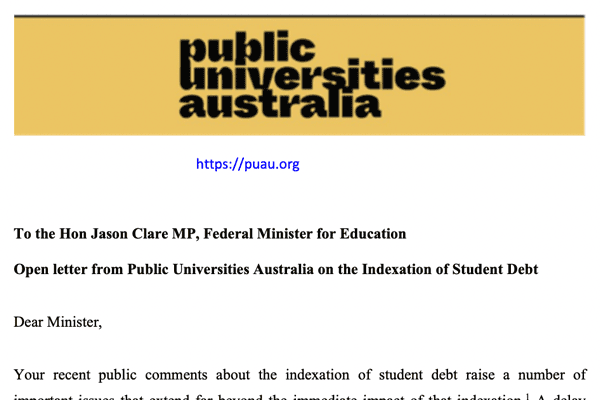The Public Universities Australia (PUA) has issued an open letter to Federal Minister for Education, Jason Clare, regarding his comments surrounding the indexation of HECS/HELP loans.
In the opening lines, it claimed that Clare could and should have delayed a final decision until the advisory report – the Accord Consultation – was released. The PUA questioned the Labor government’s rejection of free tertiary education, particularly when this is provided in countries with a lower GDP such as Malta and Uruguay.
PUA claimed that Australia does not comply with most of the articles under the 1966 International Covenant on Economic, Social and Cultural Rights, and the letter urges the Labor government to recognise education as a universal human right, rather than merely as a mechanism for economic growth.
The letter deconstructed the popular claim that HECS increased participation in tertiary education. It claimed there was little causality, especially as many students from low socio-economic backgrounds as well as those from rural and regional areas are being deterred from seeking out post-secondary education.
The PUA also emphasised that the argument that education primarily benefits national economic growth is not supported by data. “The fact is that many current government policies contribute to and exacerbate intergenerational debt”, and contribute to “lower economic growth and stagnant wages”.
The PUA wrote that between indexation measures, affordable accommodation, and the disparities between the public-private secondary school system, future students have less educational opportunities and subsequently less career pathways. This also applies to the poor outcomes experienced by Aboriginal and Torres Strait Islanders under the Closing the Gap agenda.
Additionally, the underemployment of tertiary graduates is becoming more common. Australia used to have the “best per capita ratio of doctors”, but now faces national shortages. Law graduates are in excess, but maintaining a “a profitable” career or even securing a placement is becoming more difficult. In particular, placements are increasingly unpaid and exploiting graduates by imposing costs on them without leading to employment.
As a result, PUA placed the burden for rectifying the issue on the State, Territory and Federal governments, claiming that students are not getting a value for money, and their fees are “not spent by universities directly” on education costs.
The open letter continuously reiterated its willingness to instigate further discussions with Clare and the Education Ministry. It singled out the systemic issue of wage theft that was left unaddressed by Clare, as well as the increased cost of living, access to health services, and questions over financial futures which continue to burden all tertiary students in addition to paying off their HECS/HELP loans.





